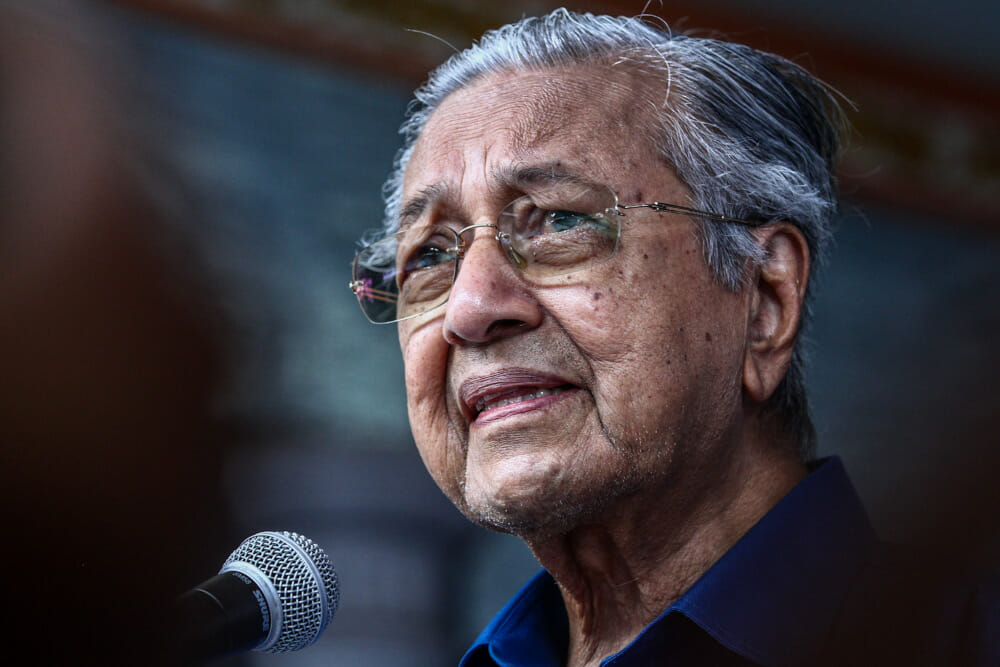
Published by The Star, Focus Malaysia, BusinessToday, Malaysiakini & AsiaNewsToday, image by BusinessToday.
Tun Dr Mahathir Mohamad is free to form his opinion on whether he is confident or not in Prime Minister Datuk Seri Anwar Ibrahim. But, before commenting on the topic of confidence, it would be best for Mahathir to assess and contemplate the people’s loss of confidence in him, his party and his coalition.
Anwar-led Pakatan Harapan (PH) coalition emerged as the biggest coalition in Parliament with 82 seats while the Mahathir-led Gerakan Tanah Air coalition received zero.
Anwar officially won the Tambun parliamentary seat with a majority of 5,328 votes, which is not a constituency known as Anwar’s stronghold, while Mahathir not only lost the parliamentary seat in his supposed easy-win constituency of Langkawi but even lost his deposit. Talk about the utter loss of confidence.
In a huge contrast, Anwar became Malaysia’s tenth Prime Minister upon receiving a mandate from his voter base, confidence from other coalitions, and endorsed by the Yang di-Pertuan Agong and the Malay Rulers while Mahathir and his party became totally irrelevant in Malaysia’s current politics.
Despite this, Anwar proved his legitimacy by also winning the motion of confidence at the First Session of the 15th Parliamentary session, gaining support from his unity government consisting of former political rivals, while top leadership in Mahathir’s Pejuang are leaving, citing the loss of confidence. Even Mahathir has left the party he founded.
Thus, as far as the topic of confidence goes, the contrast between Mahathir and Anwar is like night and day. It is best to digest, contemplate and accept the reality before commenting on the matter.
As for being worried about Anwar’s ability to navigate and address the economic issues or claiming Anwar was preoccupied with maintaining support in the Dewan Rakyat, perhaps Mahathir could not recall ever being worried about securing confidence because the system he put in place ensured that his authority will never be questioned.
In contrast to Mahathir’s brand of power concentration and collusion of power, thankfully Anwar and PH are in fact, pushing for the de-powering of the PM’s position by limiting terms, ensuring appointments of the Attorney-General and other crucial checks-and-balance organisations are made independently, separating the executive and the judiciary and many more reforms.
If anything, Anwar’s apparent “preoccupation” involves undoing the resulting corrupt machinery instilled through decades of Mahathir’s “preoccupation” with securing power. Anwar could’ve focused solely on economic issues but he ended up having to juggle cleaning up someone else’s mess of poor governance and integrity over many decades.
As for being worried about Anwar’s ability to navigate and address the economic issues, Mahathir should know it has only been a month since Anwar took office, and even then, his administration has done plenty.
Anwar’s first order of business was (and still is) to focus on addressing the cost-of-living issues, with short and long terms measures being implemented. Mahathir should know that inflation is a combination of various factors, some areas being less within the control of the government. It’s easy to criticise from the sideline.
Mahathir is unable to deny Anwar’s leadership-by-example which has been shown through cutting ministerial salaries (in addition to Anwar not taking any pay), ordering cost-cutting measures and frugality in ministries and agencies, and not taking new government car or office renovations.
Helping the people remains a focus when electricity tariff was not increased, giving tax cuts for low-cost housing, direct cash aid for students and families who are in need, special telco payment schemes for the youth, veterans and the old, and many more.
All this while not forgetting to address structural and governance issues such as ending direct tenders, reviewing costly and questionable projects and so on.
Perhaps if Mahathir has other great ideas, he should constructively convey this to Anwar. At least Mahathir might maintain some semblance of relevance in that way, instead of unproductive criticisms and comments to the press or ramblings in social media.
As mentioned in the EMIR Research article “Anwar Ibrahim’s (AI) Innovation Agenda (IA)” dated December 2, 2022, Anwar’s administration has a clear and well-defined path.
It will prioritise unity and understanding, while reforms will target the radical transparency and good governance of institutions and processes—antithetical to the “divide and conquer” Machiavellian administrations that Mahathir is well acquainted with.
After all, arguably it was Mahathir’s changes in the implementation of the New Economic Policy (NEP) over many decades that have contributed to widening racial polarisation in Malaysia.
Unlike before, the implementation of IA involves better accountability by implementing impact-oriented use of government resources that quantifies and measures outcomes and results.
Although steps such as targeted subsidies can help alleviate the impact of inflation for the ones that truly need it, crucial ecosystem changes are being done simultaneously, including the removal of inefficiencies, monopolies, middlemen, cartels and syndicates that contribute to non-competitiveness and bloated value chains.
The administration tackles this from the macro to micro levels—from rice production to egg supply, and even ending middlemen monopoly in business spaces of bazaars, “pasar malam” and “pasar tani”.
Relatedly, one of the immediate focus of this supply chain and innovation reforms in the IA would be on food security, whereby government and agricultural GLCs must take the lead in investing in and promoting the use of innovative technologies and sustainable practices in farming, fishing and livestock so that they become innovation industries.
Mahathir should be aware that although his focus on industrialisation was an economically-sound decision in line with global change that led to GDP growth and job creation, the narrow and prolonged emphasis on industrialisation led to the extreme and unbalanced shift from food crops to cash crops, contributing the food insecurity situation that we face today.
To reverse the culture of putting political allies in important organisations to ensure continued political support and the concentration of power, Anwar is already taking steps to ensure the right (qualified) people will be positioned in these organisations by first removing all politically-appointed leadership.
Long-term games such as the nurturing of start-ups, digital transformation and sunrise technologies will be focusing on developing the local industry, modernisation, and competitiveness, generating both domestic and foreign direct investment.
As for the question of capability and seriousness in doing this, Mahathir should recall his meeting with Anwar at Yayasan Al-Bukhari back in 2019 where they discussed the country’s digital economy and efforts to reduce the economic pressures facing the people.
Has Mahathir forgotten how Anwar pushed for the intensification of the digital aspect of the economy and the injection of a new aspect for the continuation of the Multimedia Super Corridor (MSC), which was inspired by Mahathir?
Anwar even launched an initiative called the Digital Native Agenda (DNA23) in that same year. How come we didn’t hear complaints about Anwar’s capabilities then?
Emerging technologies of the Fourth Industrial Revolution (4IR), particularly in the renewables space, cleantech, climate change and the circular economy will not be missed out under IA as it is obvious that there is an urgent need to balance its consumption with the environment.
All of these are meant to create public and private marketplaces and exchanges, generating growth in the domestic economy, while the reformed agents of the ecosystem (business, governance, and talents) will compete for FDI, which Malaysia has been losing to neighbouring countries in previous years.
Related to attracting foreign investments, the Innovation Agenda (IA) will not overlook the revival of Malaysia’s unique intersection between tourism, art and culture. The importance and magnitude of the combination of Malaysia’s unique amalgamation of various cultures, the creative industry and natural biodiversity are potent—a potential waiting to be tapped to its fullest potential.
Lacking real points to criticise Anwar, Mahathir resorted to age-old issues by bringing up the topic of the International Monetary Fund (IMF) and Anwar during the Asian Financial Crisis.
Though it has been acknowledged by many–even by the IMF later on–that Malaysia’s unconventional response to the crisis, particularly in capital controls and currency pegging was effective, the blanket criticism of Anwar is uncalled for and must be carefully understood.
To stroke the ego, we give credit where credit is due, but enough gloating on this.
Firstly, as explained by Anwar years ago, IMF’s recommendations were never outrightly accepted.
Secondly, what Anwar believed to be correct was regarding IMF’s assessment that Malaysia’s crisis of confidence will require addressing underlying structural problems.
Evidently, the lack of necessary reforms has led to the structural crisis of governance that we have today, which is arguably the core of most problems in Malaysia.
Either way, Mahathir should let go of this historical event as he too would know that the topic has long been easy fodder for critics trying to paint Anwar as a tool of the West, where some even go as far as accusing him of being an Israeli agent.
Clearly, some people have forgotten that Anwar was the one who reportedly brought up a national security issue during the Supplementary Bill debate on April 6, 2010, alleging that the upgrading works of the police force’s reporting and communications system involved two former Israeli intelligence personnel as sub-contractors.
The 14th General Election showed how the combination, and therefore, the cooperation between Mahathir and Anwar was potent and formidable. If only Mahathir realises this and did not let emotions get in the way.
Mahathir congratulated Anwar on his appointment as Malaysia’s 10th prime minister and even wished him well. If the ship of cooperation has long sailed, then perhaps it is time to end things on a good note, permanently.
Mahathir has done plenty for Malaysia, resulting in both good and bad, and we give credit where credit is due.
But it’s high time for self-reflection and letting things go.
Let Anwar go.
Dr Rais Hussin is the President and Chief Executive Officer of EMIR Research, a think tank focused on strategic policy recommendations based on rigorous research.

